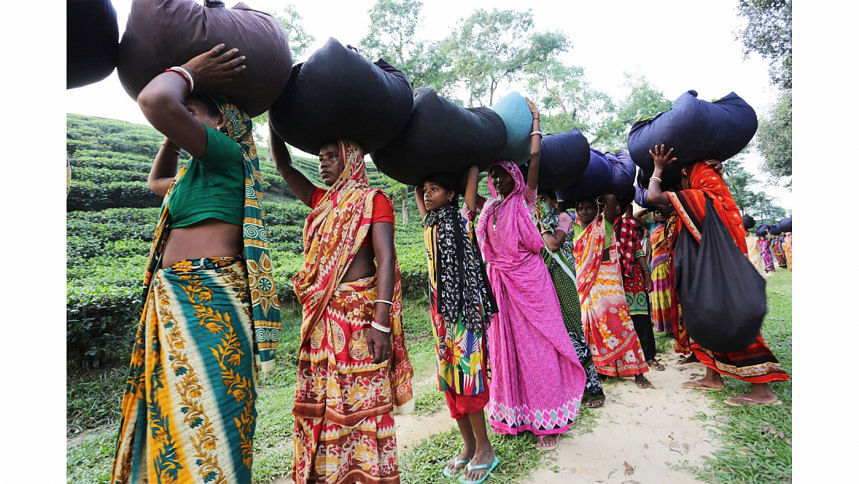An autopsy of the tea workers’ bizarre wage structure

The Minimum Wage Board (MWB), formed in October 2019, declared a draft wage structure for tea garden workers through a gazette notice published on June 13, 2021. There are daily rated and monthly rated workers in the tea gardens. The much-talked-about issue is what a daily rated tea worker gets in cash. This time, the wage board, headed by a senior district judge who actually joined as its chairman in April 2021, fixed the daily cash pay of a worker at Tk 120 for A category gardens, Tk 118 for B category gardens, and Tk 117 for C category gardens. (The category of a tea garden is determined by the volume of tea it produces—wages for the registered and casual workers are the same.)
The draft wage structure has greatly frustrated all tea workers, however. Because, they are currently getting the same wages fixed for the 2019-20 period with the agreement of Bangladesh Tea Association (BTA), which represents the tea garden owners, and Bangladesh Cha Sramik Union (BCSU), which represents 138,366 tea workers in Sylhet and Chattogram divisions. BCSU is the only trade union in the tea sector with its headquarters in Sreemangal that is popularly known as Labour House. Usually, BTA and BCSU sign a wage agreement every two years and we have always seen an increase in workers' wages every time they signed an agreement. The current daily cash pay of Tk 120, effective for the 2019-20 period, was an increase from the daily pay of Tk 102 in the 2017-18 period.
The agreement for 2019-20 expired on December 31, 2020. This means that BTA and BCSU are supposed to have a new agreement by now (to be effective retrospectively from January 1, 2021) and, as per tradition, they should have increased the workers' wages by at least Tk 20. But instead, the MWB has proposed the same wage structure of the 2019-20 tenure which has expired six months ago!
If we take a close look at the gazette notice published on June 13—which outlined the wage structure of the tea workers and around 3,000 employees in the tea gardens—we see quite a few areas where the MWB has not been pragmatic and pro-workers, and has rather, according to many, overreached itself without jurisdiction in certain areas.
The first question: is the daily cash pay of Tk 120 just? True, in addition to the cash payment, a tea worker gets rice or flour at a subsidised price (for Tk 2 per kg). A worker and his/her family get seven to eight kg of rice or flour on average every week. BCSU estimates that all that a tea worker gets in cash, and other benefits that can be considered as part of their wage, amounts to a maximum of Tk 200 a day and Tk 6,000 a month. The owners have a completely different estimate, however. They meticulously monetise all the "benefits" they think they give to the workers along with cash. Tahsin Ahmed Choudhury, Convenor of the Labour, Health and Welfare Sub-Committee at BTA, claimed during a virtual meeting organised by the Society for Environment and Human Development (SEHD) and BCSU on May 21, 2021 that what a tea worker gets amounts to Tk 403 a day.
Besides the ration at subsidised prices, some major benefits the owners reportedly monetise include house rent, equipment required for plucking tea leaves, overtime pay, owners' contribution to the provident fund, medical expense, pension, education cost of the children of tea workers, labour welfare programmes, and even incomes of tea workers generated from growing vegetables, fruits and raising cattle on land leased for production of tea. "This is a bizarre calculation, and really upsetting," says Nripen Paul, joint general secretary of BCSU. "We reject such calculations by the owners."
The labour law (section 2, sub-section 45) does not allow the employers to include in wages expenses for housing, electricity, water, medical treatment and other benefits or services that the government has provided by a general or special order, as well as pension and employers' contribution to provident fund, and cash paid to cover expenses related to their work.
If the owners have any respect for the labour law and labour rules and exclude all these fringe benefits from wages, their calculation will match that of the BCSU which shows that a worker gets no more than Tk 200 in total daily. It is in the interest of both tea workers and the tea industry that the owners be pragmatic in their calculation.
The MWB has upset the tea workers on other counts too. For example, BTA and BCSU have traditionally been signing an agreement every two years and increasing their wages little by little. The MWB, without having enough justification, has now recommended that BCSU and BTA take decisions based on mutual consensus regarding wages and other matters every three years. The provision of three years, if approved by the government, will cause significant financial loss to the tea workers who are already miserably paid. "This is absolutely unacceptable to us," says Rambhajan Kairi, the general secretary of BCSU, who represents the tea workers on the six-member wage board. "We demand an amendment to this and the tradition of taking decisions upon mutual consensus every two years must be honoured."
In tea gardens, when a worker retires or dies, a family member or relative is directly appointed in the vacant position. The MWB has limited the replacement option only to sons or daughters. Also, quite shockingly, it has added the provision of a probation period of up to six months in the wage structure. During the probation period, the wage for daily rated workers would be Tk 110. A probationer will be appointed as a permanent worker in their respective grade upon satisfactory completion of the probation period. BCSU has suggested removing this option from the wage structure because it goes against tradition (dastur) in the tea gardens. Section 9 in Schedule 5 of Bangladesh Labour Rules says that "long-standing customs and facilities in the tea gardens will remain in force". Thus, suggesting a probation period for the tea workers is contradictory to the labour rules.
The MWB seems to have blindly supported the employers on the pension/gratuity issue. The weekly pension—from Tk 20 in 2008 to Tk 150 in 2020—is simply ridiculous! The owners had, for the first time in their agreement with BCSU effective for the 2017-2018 period, agreed to pay gratuity according to the labour law. But then, much to the disappointment of BCSU, the owners backtracked, and the workers have never received any gratuity. Now the owners are out to get them to totally forget about gratuity and agree to the current pension rate (Tk 150 a week), and in all this, the MWB has apparently taken the side of the employers. The tea workers and their union continue to demand gratuity to this day.
As long as pension remains as an option, the owners should follow the provisions of the labour law. If the owners continue to stick to their claim about their total daily expense of Tk 403 for each worker, then what should be the pension amount for a worker every month? Many consider the current daily cash pay for workers as "basic". In that case, a worker who has retired should get a monthly pension of at least Tk 3,600 (120 x 30 days), and in no way Tk 600 (150 x 4 weeks).
The MWB's recommendation to reduce the already nominal amount of two festival bonuses has also no justification. It should have at least recommended the same benefits of festival bonuses as before, or increased them. Equally importantly, the MWB should have refrained from recommending spending only 0.03 percent of tea sales revenues for the welfare of workers. Rather, it should have recommended that the owners transfer 5 percent of their net profits to the workers, which they have never done, another violation of the labour law.
The MWB has also unnecessarily mentioned a few benefits that are already guaranteed by the labour law and labour rules, while on two key issues—gratuity/pension and festival bonuses—it has recommended curtailing the rights of the tea workers.
Way forward
Fourteen days were given for anyone to send observations and suggestions on the draft wage structure for tea workers and employees. The deadline came to an end on June 26. The key stakeholder, BCSU, sent its objections and recommendations, reiterating its demand of a daily cash pay of Tk 300 for a daily rated worker. A few other organisations and individuals also sent their observations, analyses and suggestions. The MWB convened a meeting on June 27 to make the wage structure final. BCSU General Secretary Rambhajan Kairi did not join the meeting on grounds that the MWB has not considered any of the workers' demands. "I am convinced from my experience in past meetings that the MWB will not consider our demands," asserted Kairi.
The office bearers of the MWB are tight-lipped about the outcome of the June 27 meeting. However, it has been known from an inside source that the MWB has not changed the wage structure and has sent its recommendations to the Ministry of Labour and Employment on June 28/29. The ministry, at this stage, can send the recommendations back to MWB within 45 days if it feels that the recommended wages are not just for the workers or owners. After the entire process is completed and the recommended wages are finally approved, the government, at any stage of implementation, can institute another MWB to re-fix the minimum wage structure. In such a case, the government can also set aside the recommended wage structure and amend or change it in consultation with the workers and owners.
At this moment, BCSU and the workers—most of them non-Bangalee, lower-caste Hindu, Adivasi, cut off from the majority population, and tied to the tea gardens—are very weak in the negotiating table. But the doors are still open for them. They need to get better organised and equipped.
According to Prof. Wahiduddin Mahmud, "The tea workers are tied to the tea gardens. They are in a very sorry state and socially excluded. Yes, increase in productivity is desired, but the calculation of profit and loss in the tea sector should be accurate so that the workers can negotiate with the owners for their legitimate rights and benefits." The calculation of what the tea workers actually get should be done by involving economists in the process, which can produce a fair assessment. Experts also highlight the importance of ensuring social protection of tea workers by the government.
The owners have arbitrarily calculated the wages and fringe benefits they say they pay to the tea workers. On the other hand, BCSU is yet to officially challenge the calculation of the owners with concrete arguments and data. However, there is no alternative to engaging independent economists and researchers in the calculation process and in determining what their living wages should be. It is imperative that they are offered a proper wage structure to help them live with dignity.
Philip Gain is a researcher and director at the Society for Environment and Human Development (SEHD).

 For all latest news, follow The Daily Star's Google News channel.
For all latest news, follow The Daily Star's Google News channel. 



Comments